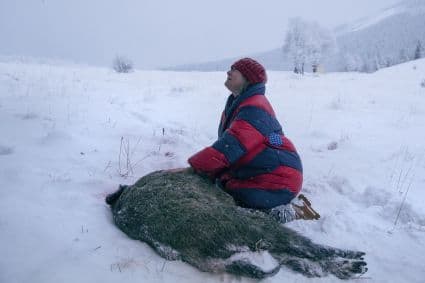Would you believe it, when two people claim that they independently have the same dream? That they dream they are a deer searching for food and company in a snowy forest. Or when a somewhat eccentric lady would emotionally implore you that those enigmatic murders in a remote Polish valley are the work of animals? These examples pop up in Berlin competition films On Body and Soul and Pokot (Track). A fortuitous coincidence, of course, but too nice not to keep them side by side for a while.
Deer dreams
The dry and precisely put down, but also enchanted by the deer dreams On Body and Soul is my favourite competition film to date. In this striking directorial debut, Hungarian Ildikó Enyedi tells the story of a young autistic woman who is employed as a quality controller in a slaughterhouse. When she discovers she shares her dreams with an equally socially awkward colleague, it is the beginning of a tentative rapprochement. By showing them in animal guise in their dream scenes, Enyedi manages to put you in touch with their emotional inner world in a very unexpected way.
In raw contrast to that serene dream world are the slaughterhouse images, in which cows end up as pieces of meat. Here, the animal plays a role somewhat similar to what the Polish Pokot us front.
Whiff of Tarantino

This film, based on a book by Olga Tokarczuk, has just been directed by a seasoned veteran. Agnieszka Holland is from the generation of Polish filmmakers to which Krzysztof Kieslowski also belonged. A generation that made Polish cinema a household name in the 1970s. Although Holland claims she wanted to throw it over a completely different book with this new film, you taste in Pokot also a touch of that expressiveness and engagement of the time. From the outset, Holland injects this mix of genres (thriller, feminist manifesto, political fable, fairy tale, a touch of Tarantino) with a nervousness that suggests that an invisible calamity is fast approaching. If only the images of the animals in the forest fleeing in panic.
The protagonist is Duszejko, a retired female engineer with a somewhat eccentric streak, a great role played by Agnieszka Mandat. She has retreated to this mountainous region, lives strictly vegetarian and firmly believes in astrology. Solitude and passion in one soul. Emboldened by what she sees happening around her, she takes on the establishment, made up mostly of hunters. Even insects are targeted by humans, she learns from a soulmate entomologist. When one of the enigmatic corpses in the forest turns out to have been eaten by those insects, Duszejko knows what it means.
Animals as metaphor
At the press conference following the conclusion of this subversive thriller, Agniesza Holland was quick to make it clear that those hunted animals may be seen as a metaphor for the weaker members of society. That the Hungarian On Body and Soul doing something similar was of course a coincidence, but Holland did see it as a sign of the times. To add quasi casually that both films were made by women and came from countries that belonged to the communist bloc at the time. As far as she was concerned, those animals also represent freedom and and dignity.
Totalitarian tendencies
The film was not initially set up that way, but gradually the conflict between the headstrong woman and the hunters in that fairytale valley took on that extra dimension. You can see in that an allusion to the struggle that all kinds of groups in society have to fight for equal rights, but Holland also referred to the worrying developments we see in today's democracies. Poland, Hungary, the United States, totalitarian and narcissistic tendencies are popping up everywhere.
Olga Tokarczuk, the book's author, added that she had chosen the hunt not only because it provides spectacular scenes, but also because it is a stage for male arrogance. In Poland, it is a meeting place for political rulers who make decisions on that occasion, Tokarczuk said. And it is not getting any better. Under the current regime, hunting laws have been relaxed, which means, among other things, that children are now allowed to participate.
